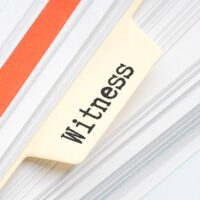Does The Prosecution Have To Disclose Their Witness List To The Defense Before Trial?

In a Florida criminal trial, the prosecution is not allowed to ambush the defense with “surprise” witnesses. To the contrary, the state’s criminal procedure rules require prosecutors to disclose the names of any witnesses they plan to call at trial. This includes identifying any “expert” witnesses who may be used to explain certain technical matters to the jury.
So what happens when the prosecution fails to properly disclose an expert witness? The trial judge must do two things. First, the court needs to decide if the prosecution committed a discovery violation. If it did, then the judge must hold what is known as a Richardson hearing–named for a 1971 Florida Supreme Court decision–to figure out if the violation was “inadvertent or willful, whether the violation was trivial or substantial, and most importantly, what effect, if any, did it have upon the ability of the defendant to properly prepare for trial.”
Florida Appeals Court Orders New Trial After Judge Failed to Hold Richardson Hearing
Earlier this year, a Florida appeals court actually ordered a new trial in a criminal case where the judge failed to conduct the required Richardson hearing. The case, Roberts v. State, involved a defendant charged with trespassing and harassing a victim. The state alleged that while in prison, the defendant called his brother and asked him to “perform a peter roll” at the victim’s address.
At trial, a police detective told the jury that a “peter roll” was a term commonly used by robbers and referred to “the use of force to take something or to intimidate.” The defense objected to this testimony, as the detective was not previously listed as an expert witness during pre-trial discovery. The trial judge overruled the objection, holding that the detective could explain the term “peter roll” without being an expert.
The jury proceeded to find the defendant guilty of trespass and harassing a victim. On appeal, the state actually conceded the discovery violation–i.e., they should have listed the detective as an expert witness. The prosecution also admitted that since there was a discovery violation, the trial court was required to conduct a Richardson hearing, which it did not. Nevertheless, the prosecution insisted these errors were “harmless” and should not affect the defendant’s convictions.
The Florida Fourth District Court of Appeals disagreed. As noted above, a Richardson hearing is mandatory when a discovery violation occurs. And both sides agreed the trial court abused its discretion in failing to conduct the hearing. More to the point, the Fourth District said it could not “say beyond a reasonable doubt that the defense was not procedurally prejudiced by the violation.” After all, had the state properly disclosed its expert witness, the defense would have had time to produce its own expert for rebuttal. As such, the appellate court said a new trial was justified.
Speak with a Florida Criminal Defense Lawyer Today
When prosecutors make mistakes, they need to be held accountable, especially when it is your life and freedom on the line. If you need legal advice or representation from an experienced Tampa criminal defense attorney, contact the Faulkner Law Group, PLLC, today.
Source:
scholar.google.com/scholar_case?case=17119768412372371441

